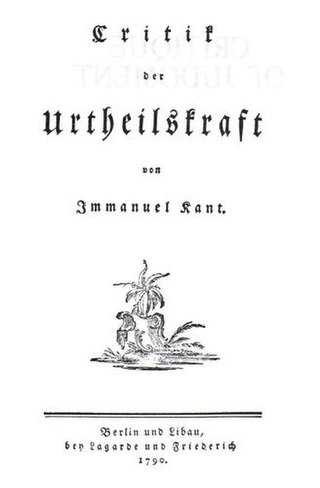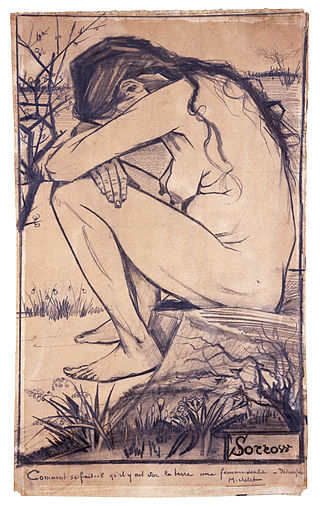
Fear is an intensely unpleasant emotion in response to perceiving or recognizing a danger or threat. Fear causes physiological changes that may produce behavioral reactions such as mounting an aggressive response or fleeing the threat. Fear in human beings may occur in response to a certain stimulus occurring in the present, or in anticipation or expectation of a future threat perceived as a risk to oneself. The fear response arises from the perception of danger leading to confrontation with or escape from/avoiding the threat, which in extreme cases of fear can be a freeze response.

Konrad Zacharias Lorenz was an Austrian zoologist, ethologist, and ornithologist. He shared the 1973 Nobel Prize in Physiology or Medicine with Nikolaas Tinbergen and Karl von Frisch. He is often regarded as one of the founders of modern ethology, the study of animal behavior. He developed an approach that began with an earlier generation, including his teacher Oskar Heinroth.

The scientific method is an empirical method for acquiring knowledge that has characterized the development of science since at least the 17th century It involves careful observation, applying rigorous skepticism about what is observed, given that cognitive assumptions can distort how one interprets the observation. It involves formulating hypotheses, via induction, based on such observations; the testability of hypotheses, experimental and the measurement-based statistical testing of deductions drawn from the hypotheses; and refinement of the hypotheses based on the experimental findings. These are principles of the scientific method, as distinguished from a definitive series of steps applicable to all scientific enterprises.

Epicureanism is a system of philosophy founded around 307 BC based upon the teachings of the ancient Greek philosopher Epicurus.
Entertaining Comics, more commonly known as EC Comics, was an American publisher of comic books, which specialized in horror fiction, crime fiction, satire, military fiction, dark fantasy, and science fiction from the 1940s through the mid-1950s, notably the Tales from the Crypt series. Initially, EC was owned by Maxwell Gaines and specialized in educational and child-oriented stories. After Max Gaines' death in a boating accident in 1947, his son William Gaines took over the company and began to print more mature stories, delving into genres of horror, war, fantasy, science-fiction, adventure, and others. Noted for their high quality and shock endings, these stories were also unique in their socially conscious, progressive themes that anticipated the Civil Rights Movement and dawn of 1960s counterculture. In 1954–55, censorship pressures prompted it to concentrate on the humor magazine Mad, leading to the company's greatest and most enduring success. Consequently, by 1956, the company ceased publishing all of its comic lines except Mad.

Discourse on the Method of Rightly Conducting One's Reason and of Seeking Truth in the Sciences is a philosophical and autobiographical treatise published by René Descartes in 1637. It is best known as the source of the famous quotation "Je pense, donc je suis", which occurs in Part IV of the work. A similar argument, without this precise wording, is found in Meditations on First Philosophy (1641), and a Latin version of the same statement Cogito, ergo sum is found in Principles of Philosophy (1644).

Solar is an American fictional comic book superhero created by writer Paul S. Newman, editor Matt Murphy, and artist Bob Fujitani. The character first appeared in Doctor Solar, Man of the Atom #1 in 1962 by Gold Key Comics and has since appeared in other incarnations in books published by Valiant Comics in the 1990s, Dark Horse Comics in the 2000s, and Dynamite Entertainment in the 2010s.

The púca, pucapwca, pooka, phouka, puck is a creature of Celtic, English, and Channel Islands folklore. Considered to be bringers both of good and bad fortune, they could help or hinder rural and marine communities. Púcaí can have dark or white fur or hair. The creatures were said to be shape-changers that could take the appearance of horses, goats, cats, dogs, and hares. They may also take a human form, which includes various animal features, such as ears or a tail.

The Critique of Judgment, also translated as the Critique of the Power of Judgment, is a 1790 book by the German philosopher Immanuel Kant. Sometimes referred to as the "third critique," the Critique of Judgment follows the Critique of Pure Reason (1781) and the Critique of Practical Reason (1788).

The Nicomachean Ethics is Aristotle's best-known work on ethics, the science of the good for human life, which is the goal or end at which all our actions aim. (I§2) The aim of the inquiry is political science and the master art of politics. (I§1) It consists of ten books or scrolls, understood to be based on notes from his lectures at the Lyceum. The title is often assumed to refer to his son Nicomachus, to whom the work was dedicated or who may have edited it. Alternatively, the work may have been dedicated to his father, who was also called Nicomachus. The work plays a pre-eminent role in explaining Aristotelian ethics.

The Horse Whisperer is a 1998 American Western drama film directed by and starring Robert Redford, based on the 1995 novel The Horse Whisperer by Nicholas Evans. Redford plays the title role, a talented trainer with a remarkable gift for understanding horses, who is hired to help an injured teenager and her horse back to health following a tragic accident.

Anarchy, State, and Utopia is a 1974 book by the American political philosopher Robert Nozick. It won the 1975 US National Book Award in category Philosophy and Religion, has been translated into 11 languages, and was named one of the "100 most influential books since the war" (1945–1995) by the UK Times Literary Supplement.
A book series is a sequence of books having certain characteristics in common that are formally identified together as a group. Book series can be organized in different ways, such as written by the same author, or marketed as a group by their publisher.
The Anna Karenina principle states that a deficiency in any one of a number of factors dooms an endeavor to failure. Consequently, a successful endeavor is one for which every possible deficiency has been avoided.

Monster Allergy is an Italian comic book series created by Alessandro Barbucci, Katja Centomo, Francesco Artibani and Barbara Canepa of Sky Doll. Barbucci and Canepa had previously co-created the W.I.T.C.H. comic series. Monster Allergy lasted 29 issues; however, it is still in the course of reprints, in newspaper stands on the 13th of every month. In 2008, Barbara Canepa stated that she and her co-creators gained back the copyright to Monster Allergy after its first publishing run.

Natural horsemanship is a collective term for a variety of horse training techniques which have seen rapid growth in popularity since the 1980s. The techniques vary in their precise tenets but generally share principles of "a kinder and gentler cowboy" to develop a rapport with horses, using methods said to be derived from observation of the natural behavior of free-roaming horses and rejecting abusive training methods.
Daniel Sullivan from Mallow, Co. Cork, Ireland, was an Irish horse trainer who specialised in rehabilitation of horses that were unresponsive to traditional methods. A large portion of his work took place in England.

The Battle of Camp Hill took place on Easter Monday, 3 April 1643, in and around Camp Hill, Warwickshire, during the First English Civil War. In the skirmish, a company of Parliamentarians from the Lichfield garrison with the support of some of the local townsmen, approximately 300 men, attempted to stop a detachment of 1,400 Royalists under the command of Prince Rupert from passing through the unfortified parliamentary town of Birmingham.

Sorrow is an emotion, feeling, or sentiment. Sorrow "is more 'intense' than sadness... it implies a long-term state". At the same time, "sorrow — but not unhappiness — suggests a degree of resignation... which lends sorrow its peculiar air of dignity".
Darby Pop Publishing is an American comic book publishing company founded in 2013 by film writer and producer Jeff Kline. Sixteen original series and 100+ issues/TPs have been published to date. Creators have included Eric Garcia, John Raffo, Scott Marder/Rob Rosell/Jack Lambert (Doberman), Matthew Federman & Stephen Scaia, and Kline himself (Indestructible).













